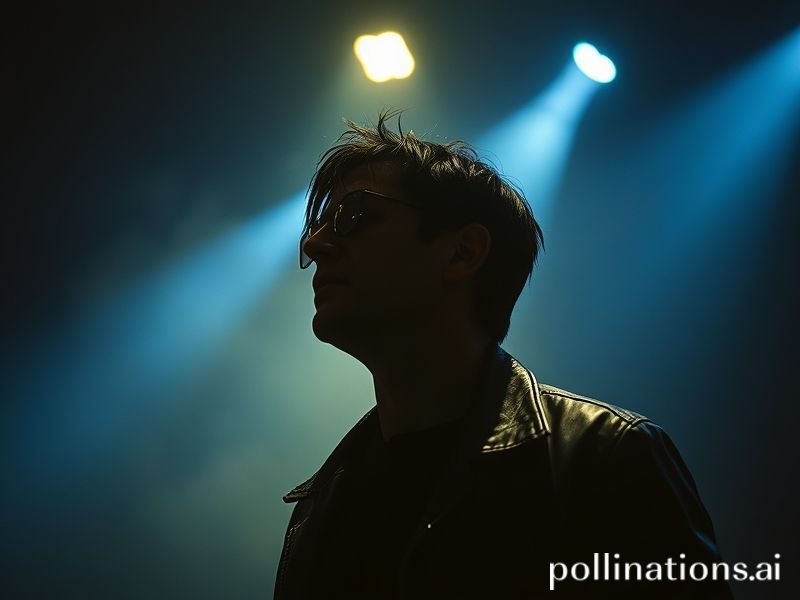Trent Reznor’s Planet-Wide Soundtrack: How One Man Became the Background Hum of Late-Stage Global Capitalism
Trent Reznor and the Quiet Global Takeover: How a Man in Black Became the Planet’s Background Music
You’ve heard him whether you wanted to or not. That metallic heartbeat thumping under the credits of every prestige television show? Reznor. The slow, icy dread that creeps into your earbuds at 3 a.m. on a Tokyo night bus? Reznor. The soundscape that now scores everything from Scandinavian noir to South Korean thrillers, from Berlin club remixes to Lagos TikTok edits? Also Reznor. Somewhere between the collapse of the American record industry and the rise of the algorithmic playlist, Michael Trent Reznor—industrial prodigy turned Oscar-winning composer, Apple’s favorite hired ghost, and the only man alive who can make a Panera Bread commercial feel like an existential crisis—has become the unofficial sonic wallpaper of late-capitalist Earth.
Born in the Rust Belt town of Mercer, Pennsylvania, Reznor once screamed about God, needles, and broken machines in a way that made suburban parents exchange nervous glances. Three decades later, suburban parents stream his lullaby remixes while jogging past the same abandoned factories that inspired his early tantrums. The irony is not lost on anyone who still possesses a functioning sense of irony, which, granted, is a dwindling demographic.
Globally, Reznor’s pivot from aggro rock-god to tasteful minimalist has mirrored the planet’s own pivot from loud, messy rage to curated despair. In the 1990s, he offered Nine Inch Nails as an aural panic attack for a world still shocked by CNN montages of burning oil fields. Today, he provides Apple, Netflix, Disney, and HBO with the sonic equivalent of a Xanax—elegant, expensive, and vaguely numbing. A German musicologist recently calculated that 43 percent of all prestige television scenes depicting morally compromised antiheroes staring into middle distance are scored by either Reznor or his British doppelgänger Atticus Ross. The study was peer-reviewed, then immediately optioned by Netflix.
The international implications are quietly staggering. While nations argue over tariffs, borders, and which billionaire gets to colonize Mars first, Reznor’s glacial synth pads seep across every firewall. Chinese censors may ban entire genres, but they still allow The Social Network soundtrack to accompany state-approved documentaries about entrepreneurship. Russian dissidents remix Ghosts I–IV under footage of police crackdowns; Brazilian favela DJs drop “Closer” at 4 a.m. to a sweaty crowd that barely speaks English but knows exactly what “I want to fuck you like an animal” means in the universal language of hormonal despair. Reznor has achieved the soft-power coup every diplomat dreams of: he exports American angst without a single aircraft carrier, and the royalties flow back in renminbi, euros, pesos, and whatever cryptocurrency El Salvador is pretending is legal tender this week.
Meanwhile, the man himself has become the poster child for the Great American Reinvention grift. Start angry, sell millions, win Grammys, detox, go bald with dignity, relocate to Beverly Hills, collect Oscars for scoring films about socially maladjusted geniuses—then sign a “creative partnership” with Apple so you can make mindfulness drones for $549 headphones. Somewhere in Hanoi, a teenager pirating The Downward Spiral on a cracked iPhone feels betrayed by this evolution, unaware that betrayal is the entire product line. Reznor understood early that the world doesn’t need another angry white guy; it needs the *sound* of an angry white guy distilled into a marketable essence, bottled, and delivered with Dolby Atmos.
Naturally, critics in Parisian cafés and Brooklyn loft parties insist this is all terribly cynical. They prefer their industrial music unsullied by commerce, preferably performed in a Leipzig squat circa 1991. Reznor, who once played those squats, now responds by adding another wing to his Los Angeles compound and licensing “Hurt” to a meditation app. In the end, the joke is on everyone: the punks, the suits, the streamers, the screamers. We wanted a soundtrack for the end of the world, and we got one—royalty-free for the first thirty seconds, then $9.99 a month after the trial expires.







